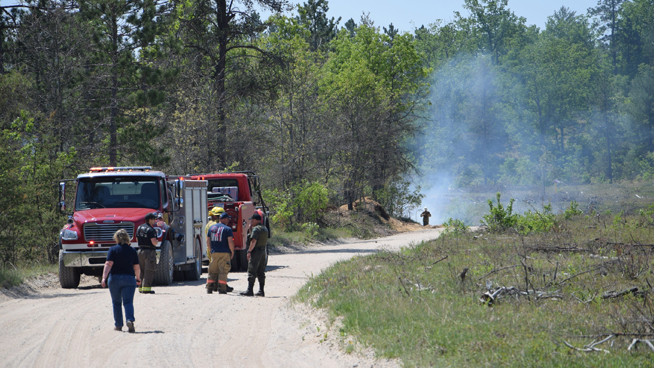
GRAYLING, June 5, 2023 ~ In a northern Michigan forest, a lone campfire sparked a 2,400-acre blaze still being battled by fire fighters.
The Wilderness Trail Fire began Saturday, June 3 in a forest near Grayling, with fire personnel containing over 90% of the fire as of Monday afternoon. This comes as the mid-Michigan region saw a lengthy period of drought-like conditions throughout May.
Authorities determined that the wildfire stemmed from a campfire on private land near Staley Lake in Grayling Township. The fire quickly began spreading west, with emergency personnel conducting evacuations Saturday in the area, though evacuation orders have since been lifted. Temporary flight restrictions were put in place around the burn area and I-75 near the site was closed for most of Saturday.
Gov. Gretchen Whitmer activated the State Emergency Operations Center Saturday to help organize the wildfire response. Michigan Department of Natural Resources, local, federal firefighters, and 10 firefighters from the Wisconsin Department of Natural Resources all responded to the blaze.
So far, the Michigan DNR estimates that 35 homes, 38 vehicles, and 58 outbuildings were threatened by the blaze.
PODCAST:
June 5, 2023 ~ Firefighters continue to battle a wildfire in Grayling that has so far consumed 2,400 acres. Marie Osborne, 760 WJR senior news analyst, brings us the latest on the cause of the Wilderness Trail Fire, and the efforts underway to contain the blaze.
(CONTINUED) Marie Osborne, 760 WJR news analyst, told WJR host Paul W. Smith that it was not surprising to see the fire spread so rapidly. May was a particularly dry month for Michigan, with the state receiving less than an inch of its usual 3 to 4 inches of rain, Osborne said. Weather conditions like these have not been seen in Michigan for over 20 years, she added.
The DNR issued wildfire warnings back in April and May in the northern part of the Lower Peninsula, with a 10-acre fire starting in Grand Traverse County over Memorial Day weekend.
Central Michigan University Meteorology Professor John Allen, who specializes in extreme weather and climate, said to WJR that droughts are associated with large scale patterns of blocking, where atmospheric patterns stay put. This blocking prevented low-pressure systems associated with rainfall moving from areas like the Rocky Mountains to Michigan, allowing drought conditions to develop.
While the source of the fire was from human activity, Allen said low humidity and high winds helped spread the Wilderness Trail Fire to the size it was. Dry leaves on the ground from the fall did not rot away like they usually would with spring rainfall, providing additional kindling for the fire.
Michigan is certainly not immune to wildfires and droughts historically, but Allen said the state is probably among its ten driest conditions on record. Whether or not this event relates to climate change and is an indicator of more frequent wildfires starting in Michigan, he said it is too early to say. Individual weather events cannot be attributed to climate change without a study, he added.
However, Allen said people should perhaps start thinking more about wildfires in Michigan and research more into how climate change might impact Michigan.
“From a (warming) climate perspective, our expectation in general is for more warm, elongated periods over which fires could occur,” Allen said. “In Michigan, that is complicated because we do not know how these increasingly dry periods may coincide with periods of increased rainfall. We are certainly seeing an elongation of drying periods in future climates, but there may be more intense precipitation in short bursts (in Michigan).
“Those increases and that preconditioning probably means it is more likely we are going to see wildfires, and a lot of the projections would indicate (Michigan is) moving in that direction. In this event, it is too early to say, and I do not think it is responsible to (say) that because it is weather, not climate. But, this is something that we need to pay attention to.”
Osborne said people should take fire warnings seriously, and that campfires should not be left unintended for even a moment.




